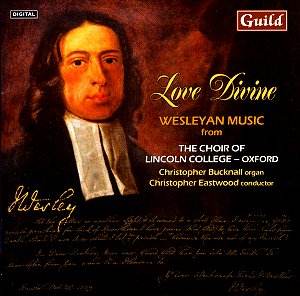John Wesley studied at Lincoln College, Oxford
and it was there, with his brother Charles, that he formed the
Holy Club designed to give the like-minded young men a disciplined
regime of holy living. It was that regime which led to the name
Methodism, at first applied satirically. Singing hymns was always
a large part of the Wesley's itinerant evangelism and their first
collection of hymns was published in 1738.
This disc, recorded by the choir of Lincoln College
is designed to celebrate the Wesley's connection to the College.
But the disc is not what it might first appear to be as the choir
sing just six hymns by the Wesleys and it is to Samuel Sebastian
Wesley that the bulk of the programme belongs.
There is just one hymn by John Wesley (a translation
from the German) and five by Charles Wesley. Of these, only one
(Lo! He comes with clouds descending') is sung to the tune that
was associated with it by the Wesleys. All the others have acquired
new tunes subsequently and the choir sing these more familiar
versions. Another hymn, ('Rejoice the Lord is King') was set by
Handel, who was an older contemporary of the Wesleys, but this
setting was not published until Samuel Sebastian Wesley (the grandson
of Charles) published it in the 19th century.
Besides one of his hymns, setting his grandfather's
words, the choir sing six of Samuel Sebastian's anthems. Organist
of Hereford, Exeter, Winchester and Gloucester Cathedrals and
Leeds Parish Church, Samuel Sebastian did much to reform Anglican
church music and introduce contemporary harmony and forms into
the rather stale and old-fashioned Anglican anthem.
This is an attractive programme and it is useful
to have the collection of Samuel Sebastian's anthems. But his
sublimely Anglican anthems rather dilute the Methodist fervour
of Johns and Charles's hymns, a fervour further diluted by using
the traditional tunes rather than ones known to John and Charles.
A case could be made for a programme devoted to the Wesley family,
but then you would surely have to include something by Samuel
Sebastian's father, Samuel Wesley. Samuel Wesley was a child prodigy
(writing his first oratorio at the age of eight). Whilst his music
might not stand extensive revival, a programme devoted to his
father, uncle and son could have fitted in one of his own pieces
and it would have made a far stronger selection. What we are left
with sounds like typical fare from the college services. This
is no bad thing, but the programme had the potential to be something
more memorable.
That said, the choir of Lincoln College make
a wonderfully clean wholesome sound and sound ideal in this music.
A choir with female sopranos and a mixture of female and male
altos, the choir has all the virtues (and the odd problem) that
come with young voices. The upper parts can make an ethereally
pure sound and all voices sing with crispness and liveliness.
But the inner parts can lack definition, there are occasional
moments of untidiness and the extremes of Samuel Sebastian's bass
parts tax the young baritones in the choir.
The choir fields a fine array of soloists, particularly
Silvie Garnsey who contributes a lovely pure, clean treble solo
in Samuel Sebastian's 'Blessed be God the Father'. Where the soloists
act as a semi-chorus, then they sound heavenly. But the soloists
are taxed by the more complex, operatically inspired solo passages
in Samuel Sebastian's anthems. In chapel, on a Sunday evening,
they undoubtedly make a fine impression, but on record the fine
detail and experience is lacking so that these solo passages lack
finesse.
They are not always helped by the conductor,
Christopher Eastwood (for two tracks he and organist Christopher
Bucknall enterprisingly swap roles). He does not have an adequate
feel for the structure of Samuel Sebastian's extensive multi-section
structures. Samuel Sebastian started his working life at the English
Opera House and brought these influences to bear in his early
anthems. Too often, you feel that conductor, choir and soloists,
consider each section as a separate entity and any overall structural
feeling is lost. This may, however, be a fault of the recording
process if the anthems were recorded in sections.
Regarding the hymns, some radical rethinking
was called for. The choir sing them musically enough, varying
between unison and harmony. They would make an inspiring backing
during college services. But listening to these hymns on a CD
player, they all sound terribly slow and not a little dreary.
Rather than perform them in the standard congregational way, choir,
organist and conductor should have remade them anew as small anthems,
suitable for armchair listening. In the hymns, the choir's diction
is adequate, but entirely lacks the feeling for the text and the
fervour that would surely come from the original performances.
Rather than giving us an insight into Charles Wesley's revolutionary
hymnody, these performances resound with comfortable Anglicanism.
Whilst Samuel Sebastian Wesley's anthems remain
popular on anthologies of English choral and cathedral music,
collections of his anthems are rarer. Both the New College collection
on CRD and Worcester College's collection on Hyperion seem to
have been deleted. So if you are interested in a collection of
Samuel Sebastian's anthems, then consider this collection. But
if you are interested in John and Charles Wesley's hymns, then
I suggest that you look elsewhere.
Robert Hugill
see also
review by John Portwood

